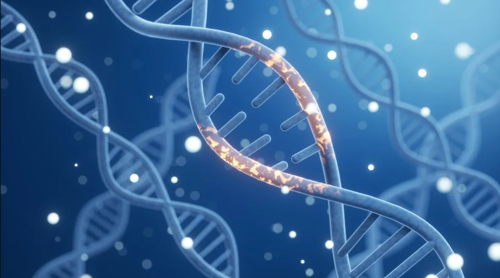Analysing the entire genetic code of cancer patients can help deliver treatments that work better for the individual, experts have found.
In the biggest study of its kind, with 13,000 cancer patients in England, combining clinical data and DNA evidence meant care could be tailored.
Based on the results, some were given different drugs or avoided ones likely to cause them side effects.
Most brain tumours had genetics that affected treatment decisions.
In the study, published in Nature Medicine, more than nine out of every 10 brain tumours and most bowel and lung cancers exhibited genetic changes that could guide decisions about surgery or specific treatments.
Whole-genome sequencing (WGS) analyses someone's entire genetic code - all 3.2 billion letters that make up their DNA.
Cancer patients have:
- the baseline "healthy" genome they inherited from both parents - here, the DNA is extracted via a blood test
- the corrupted genome found in their cancer, which is made up of both healthy and mutated DNA and taken via a biopsy
The first can show genetic variations that may make them more susceptible to cancer - the BRCA1 mutation can increase the risk of breast and ovarian cancer, for example.
The second can show which genes are helping to spread their cancer and whether they may be more likely to suffer adverse side effects from some drugs.
In more than 10% of sarcomas - solid cancers in the bone and muscle - the researchers found genetic changes that revealed different sub-types of the cancer, which, in turn, helped doctors choose the correct treatment.
They also found more than 10% of ovarian cancers were probably inherited, offering insights into clinical care and potential testing of family members.
The study, led by Genomics England, NHS England, Queen Mary University of London, Guy's and St Thomas' NHS Foundation Trust and the University of Westminster and completed in 2018, analysed data covering over 30 types of solid tumours.
"We are starting to realise the promise of precision oncology that was envisioned 10 years ago, when the 100,000 Genomes Project was launched," she said.
"We are showing how cancer genomics can be incorporated into mainstream cancer care across a national health system - and the benefits that can bring patients.
"By collecting long-term clinical data alongside genomic data, the study has created a first-of-its-kind resource for clinicians to better predict outcomes and tailor treatments, which will allow them to inform, prepare, and manage the expectations of patients more effectively."
'Tremendous opportunities'
The results had been fed back to clinical teams, Dr Murugaesu said.
And at least one trust in the East Midlands had taken action in about one in every four of the cases, mostly putting patients into clinical trials or ensuring they avoided medicines for which they had an increased risk of side effects.
Genomics England scientific director for cancer Dr Alona Sosinsky said: "The 100,000 Genomes Project paved the way for delivering whole-genome sequencing in cancer.
"This technology opens tremendous opportunities for precision oncology."
Source: BBC





